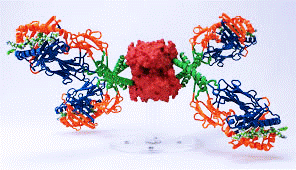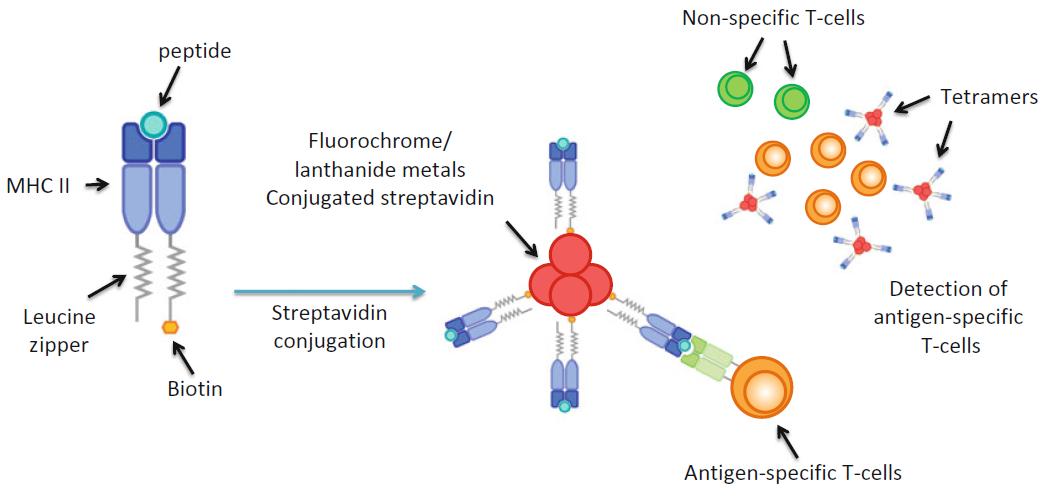MHC-peptide tetramers are complexes formed by the binding of four copies of a specific peptide and the major histocompatibility complex (MHC) protein. They are widely used in immunology research to study immune responses, particularly those involving T cells. Creative Peptides has launched a series of MHC-peptide Tetramers which are ready-to-use reagents conjugated to a fluorochrome group such as Brilliant Violet 421(BV421), phycoerythrin (PE), or allophycocyanin (APC).

An MHC tetramer is a specialized tool designed to study T cell interactions with specific antigens. It comprises four Major Histocompatibility Complex (MHC) molecules covalently linked to form a tetrameric structure. This arrangement enhances both the stability and the avidity of interactions between the MHC molecules and T cell receptors (TCRs). By presenting peptide antigens in this tetrameric format, the tool facilitates a more stable and sensitive interaction with TCRs compared to individual MHC-peptide complexes. This increased stability allows researchers to detect and analyze T cell populations with high specificity. MHC tetramers are crucial for investigating immune responses, analyzing T cell receptor diversity, and exploring various aspects of cellular immunity.
 (Kong, Ying Ying, et al., 2019)
(Kong, Ying Ying, et al., 2019)
An MHC-peptide tetramer is a specific type of MHC tetramer where each MHC molecule is loaded with a peptide antigen. This complex is designed to specifically bind to T cell receptors (TCRs) that recognize the peptide-MHC complex. The MHC-peptide tetramer enhances the detection and analysis of T cells that are specific to the peptide antigen by providing a tetrameric form of the MHC-peptide complex, which increases the interaction's stability and sensitivity.
The relationship between MHC tetramers and MHC-peptide tetramers is that MHC-peptide tetramers are a specialized application of MHC tetramers. While MHC tetramers generally refer to the tetrameric form of MHC molecules, MHC-peptide tetramers specifically involve MHC molecules bound to peptide antigens. This distinction allows MHC-peptide tetramers to be used for the precise identification and analysis of T cells that respond to specific peptide antigens, facilitating detailed studies of immune responses and the development of targeted immunotherapies.
MHC-peptide tetramers are intricate constructs used to visualize and quantify antigen-specific T cells. These tetramers are comprised of four Major Histocompatibility Complex (MHC) molecules, either MHC class I or MHC class II, each complexed with a specific peptide antigen. The structure of the MHC-peptide tetramer starts with the MHC proteins, which are designed to bind a particular peptide antigen within their peptide-binding groove. For MHC class I, the peptide is typically 8-10 amino acids in length, while for MHC class II, the peptide is usually 13-25 amino acids long. This peptide-MHC complex forms a stable structure that is essential for the effective binding of T cell receptors (TCRs).
To enhance detection, the four peptide-MHC complexes are linked together to form a tetrameric structure, and each tetramer is conjugated to a fluorescently labeled streptavidin molecule. Streptavidin is chosen due to its strong and specific binding to biotin, which is used to link the MHC-peptide complexes together. The addition of a fluorescent label to streptavidin enables the visualization and quantification of the tetrameric complexes using flow cytometry or other imaging techniques. This fluorescent labeling allows researchers to identify and measure the frequency of T cells that specifically recognize the peptide antigen by detecting the fluorescent signal emitted from the tetramer-bound T cells. This detailed structure makes MHC-peptide tetramers an invaluable tool for studying antigen-specific T cell responses and understanding immune system dynamics.
In 1996, the development of reagents consisting of soluble MHC class I–peptide complexes, which was applied to detect CD8+ cells by flow cytometry, had effectively promoted a revolution of antigen-specific T cells. Traditionally, TCR (T cell receptor) has a low avidity and fast off-rate for MHC-peptides complexes, recombinant soluble monomeric MHC-peptide complexes have not been used to detect antigen-specific T cells. Recently, Stanford University School of Medicine has presented MHC-peptides tetrameric complexes (MHC tetramers) in the detection of antigen-specific T cells, thus provided an efficient method to visualize, quantify, phenotype and sort antigen-specific cytotoxic T lymphocytes (CTLs) directly from a wide range of biological samples and have now become standard reagents in laboratories around the world.
Identification of Antigen-Specific T Cells: MHC-peptide tetramers are used to specifically label and identify T cells that recognize a particular peptide antigen. By binding to T cell receptors (TCRs) with high affinity, these tetramers enable the precise detection of T cells that are specific to a given antigen, even among a mixed population of T cells.
Quantification of T Cell Responses: Through flow cytometry or other detection methods, MHC-peptide tetramers allow researchers to quantify the frequency of antigen-specific T cells within a sample. This quantification helps in understanding the magnitude of the immune response and can be used to compare responses across different conditions or treatments.
Characterization of T Cell Receptor Specificity: MHC-peptide tetramers facilitate the study of T cell receptor specificity by directly linking a specific peptide to MHC molecules. This interaction reveals how well different TCRs recognize the peptide-MHC complex, providing insights into the diversity of TCRs and the specificity of immune responses.
Monitoring Immune Responses: In clinical and experimental settings, MHC-peptide tetramers are used to monitor the dynamics of antigen-specific T cell populations over time. This monitoring is crucial for evaluating the effectiveness of vaccines, understanding disease progression, and assessing the impact of immunotherapies.
Development of Immunotherapies: MHC-peptide tetramers play a key role in the development and evaluation of immunotherapies, including cancer vaccines and adoptive T cell therapies. By identifying and isolating T cells with desired specificities, researchers can enhance the efficacy of therapeutic interventions and tailor treatments to target specific antigens.
Basic Immunology Research: In fundamental immunology research, MHC-peptide tetramers are used to investigate various aspects of T cell biology, such as T cell activation, differentiation, and memory formation. They provide a powerful tool for studying how T cells recognize and respond to antigens, contributing to our understanding of immune mechanisms and the development of novel therapeutic strategies.
Investigation of Immune Responses: MHC-peptide tetramers are used to study the immune response to specific pathogens by detecting and quantifying T cells that recognize the pathogen's peptide antigens. This application provides detailed insights into how the immune system responds to infections.
Vaccine Monitoring: They help in evaluating vaccine efficacy by tracking antigen-specific T cells that are activated by the vaccine. This allows researchers to assess the effectiveness of vaccines in generating a robust and targeted immune response.
Autoimmune Disease Research: MHC-peptide tetramers are employed to detect and quantify autoreactive T cells involved in autoimmune diseases. This application aids in understanding the mechanisms of autoimmunity and discovering new therapeutic targets for autoimmune disorders.
Cancer Immunology: In cancer research, MHC-peptide tetramers are used to identify and analyze T cells that target tumor-associated antigens. This helps in understanding the role of these T cells in tumor immunity and developing targeted immunotherapies.
Transplant Immunology: They are utilized to monitor T cell responses to transplanted tissues or organs by detecting T cells specific to donor antigens, which is crucial for managing transplant rejection and improving graft survival.
Basic Immunological Research: MHC-peptide tetramers facilitate fundamental studies on T cell development, activation, and memory formation by providing tools to explore the specificity and diversity of T cell responses in various experimental settings.
Creative Peptides develops, manufactures and markets a wide range of MHC-peptide Tetramers. Our MHC-Peptide Tetramer services provide customized MHC/peptide tetramers for identification of antigen specific T lymphocytes by flow cytometry. With years of experience in one-stop services including manufactures of MHC-peptide Tetramer, custom synthesis of related peptides, and even MHC-Tetramer assay services, Creative Peptides must be your exclusive choice in solving scientific and clinical challenges by providing a consultative approach, superior technical and customer support. If you are interested in any MHC Tetramer products, please feel free to contact us. We will be more than happy to serve you!
Customizable Solutions: Creative Peptides offers customizable MHC-peptide tetramers tailored to specific research needs, including various peptides and MHC molecules, to suit diverse experimental requirements.
Fluorescent Labeling: The tetramers are available with different fluorescent labels, enabling versatile and precise detection methods using flow cytometry and other imaging techniques.
Comprehensive Support: Creative Peptides provides expert support and consultation for optimizing the use of MHC-peptide tetramers in research, ensuring effective application and interpretation of results.
High-Quality Reagents: The MHC-peptide tetramers are produced with high-quality reagents and rigorous quality control, ensuring reliable and reproducible results for research applications.
References